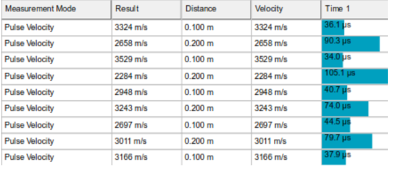Testing of Concrete Structures with Non-Destructive Test Method (NDT) Using Ultrasonic Pulse Velocity (UPV) at the Building on the Ancol Beach
DOI:
https://doi.org/10.24036/cived.v11i1.530Keywords:
Concrete, Structure, UPV Test, BuildingAbstract
The UPV test procedure with the PUNDIT device is set based on the concept of the wave flow speed passing through a solid object bound to the elastic properties of a tangible medium. When used properly and correctly, this tool will provide a lot of information about the condition of the surface or the inside of the concrete. Classification for pulse velocity results according to the speed criteria of concrete quality presented in BS 1881: Section 203:1986 as follows: 4500 m/s = excellent concrete condition, 3400 – 4500 m/s = good concrete conditions, 3000-3500 m/s = medium concrete situation, < 3000 m/ s = concrete problem condition (doubtful concrete condition). The pulse velocity test results are measured by three methods: direct transmission, semi-direct transmission and indirect or surface transmission. The test results for the structure of the beams, cylinders, tie beams, and floor plates of the office building on the edge of the anchor showed that it is in medium concrete condition. The average value of the estimated quality of concrete results of the test UPV Pundit for Beams was 25,29MPa, Slabs was 25,17MPa, Tie Beam was 25,06MPa, and Pilecap was 25,46MPa. The result has met the minimum requirement for concrete solid pressure of 21MPa for the quality of unique structures concrete according to SNI-2847-2019.
Downloads








2.jpg)
